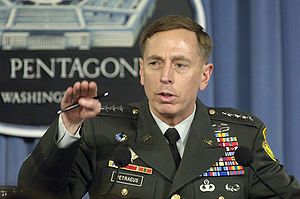 Image via WikipediaNever before in US History has an American president surrendered to a foreign power. Never before have we lost a war. Never before has a president surrendered after victory was final, total, complete, and a resounding success for all sides involved.
Image via WikipediaNever before in US History has an American president surrendered to a foreign power. Never before have we lost a war. Never before has a president surrendered after victory was final, total, complete, and a resounding success for all sides involved.
Barack Hussein Obama has ensured his status as the worst president in the history of the United States of America. All that remains is to watch, helplessly, as Iraq descends into chaos, anarchy, and either an Al Queda haven or an Iranian puppet state - or both...T
The Iraqi government lost more than a fighting ally when the last U.S. troops left the country Sunday.
Since the 2003 invasion, U.S. service members had woven themselves into the fabric of Iraq’s power structure - its politicians, soldiers, village elders and tribal sheiks.
Army and Marine Corps officers acted as small-town mayors. They had authority to spend nearly $4 billion over seven years on local construction and humanitarian projects via the Commanders Emergency Response Program.
U.S. military personnel - whether sergeants, platoon leaders or brigade commanders - helped settle major political disputes in Baghdad and brokered talks at local levels among various tribal chiefs.
Their power base: as many as 170,000 U.S. troops, M1 tanks, advanced jet fighters and the American military uniform.
Now all that persuasive power is gone. Left to fill the void are the State Department and a limited diplomatic presence at the U.S. Embassy and two stations outside Baghdad.
It took only one day after the U.S. exit for Iraq’s Shiite Muslim majority to move against the highest-ranking Sunni, accusing the country’s vice president of terrorism and provoking a government crisis in the process.
“Our pullout is not just the number of brigades, it’s not about the numbers,” said retired ArmyMaj. Gen. Robert H. Scales, who has been to Iraq as an independent adviser and has interviewed returning soldiers.
“The Army had a postgraduate course in how to kill insurgents and work with the people,” he said. “They became toward the end the glue that tied together these factions in Iraq whose natural condition is to spiral apart.
“The Iraqis relied on us not just to kill insurgents and train the Iraqi army or do nation-building; they relied on us as an excuse to stay together.”
The Pentagon’s counterinsurgency strategy embodied more than killing. Protecting and winning over the population stood as a major goal, particularly after 2006, when Gen. David H. Petraeus rewrote the doctrine and took command in Baghdad.
It put emphasis on the commanders’ pocket money through the emergency response program. Officers could make spot decisions to build or fix a building, start electric power or make a condolence payment - without a lot of red tape.
In one town, cash on the spot enabled the Army to build a sports/community center, renovate a fruit-and-vegetable stand and complete a water-sewage treatment plant.
Then there was the pivotal 2004 battle to defeat Sheik Muqtada al-Sadr’s marauding militia in southern Iraq, a beating that told the fiery cleric that he would not rule Iraq by force. The militia had taken over several towns - including Karbala, Najaf, Kufa and Diwaniyah - and imposed harsh Islamic law with terrorism and executions.
The Army’s 1st Armored Division executed Operation Iron Saber in stages, first destroying the enemy, then shifting to people-to-people programs that made soldiers part of the town’s leadership.
“I’ve got to think this was a watershed operation in terms of how to do things as part of a counterinsurgency,” Brig. Gen. Mark P. Hertling, an assistant division commander at the time, told The Washington Times.
The battle over, the Army began hiring local Iraqis for construction projects and reassembling the security forces who had fled.
“We crossed over from bullets to money,” Gen. Hertling said.
Gen. Scales told The Times that Iraqis no longer will have U.S. soldiers at the ready to make sure the local security forces fulfill their missions.
“Those in uniform maintain their cohesion based on their associations with us,” he said. “There still is value in being around a cohesive Western power that is essentially an army of a democracy.
“You know the old adage ‘leading by example.’ The Iraqis’ natural tendency is to break apart, especially at the midlevel management of the army in the past, was often assuaged by the moral presence of a respected U.S. Army.”
By 2011, lieutenant colonels who had been to Iraq in 2003 and 2004 are generals and have made as many as five tours to the country. “They had built long-standing friendships with Iraqis,” Gen. Scales said.
One such player is Army Col. John Paul Digiambattista, who did three tours, the last as a brigade commander.
He spoke with Talkingwithheroes.com about the noncombat chores his brigade carried out in 2010 as it worked within a provincial reconstruction team to improve local governments.
“There are still efforts we can make to improve the government, improve what the government does for the people,” he said. “Democracy does not come easy.”
It is this intangible that the Iraqis will miss - the presence of Americans in the background who can step in to prod the government or help settle disputes.
“For those forces in Iraq whose aim was to keep the state together and rely on the U.S. Army for being a builder of the state, there was real trepidation about the American military leaving so precipitously,” Gen. Scales said. “A residual force is not just a bunch of privates sitting around Camp Victory eating hamburgers. A small residual force, had it remained in Iraq, would really have punched above its weight because of who it was by that time.”
Full article in new window
Friday, December 23, 2011
U.S. exit from Iraq leaves a power void - And ensures Obama's Place in History as Worst U.S. President
Posted by Navitor at 5:59 PM 0 comments
Labels: Democratic Party - Anti American, Iraq and the Anti American Left
Subscribe to:
Posts (Atom)

 Stumble It!
Stumble It!










